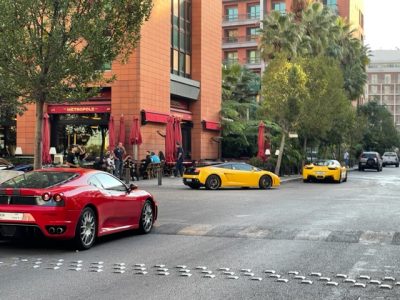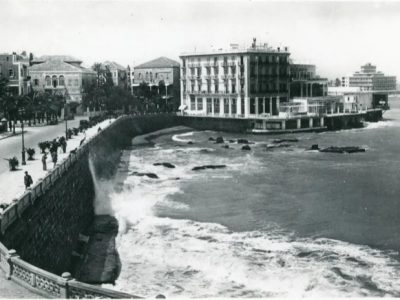The Many Funny Faces of Lebanon's Failed State
Since 2019, when the Lebanese experiment officially unraveled, the topic of conversation among the chattering class has been about the shape of the coming collapse. What could we expect to emerge from the wreckage of a broken Lebanon? Civil strife? Social disintegration? Chaos? A mishmash of sect-based cantons? A cocktail of these, perhaps? Expectations kept gravitating towards the spectacular.
The conversations spoke of the disconnect among many Lebanese, especially those of us safely inhabiting the locales of comfort and privilege. The state, the financial and economic sectors, and society had already succumbed and we were already living the aftermath, but chatter was bizarrely abuzz about the approaching catastrophe.
It’s as if the crash of the lira; the people’s wiped-out savings; the bankruptcy of the banking sector; the banks’ refusal to declare it while severely limiting access to our bank accounts; the four official exchange rates; the near total lack of public electricity; widespread water shortages; the paralyzed government and its ministries; a public sector incapacitated by absent or striking employees; the frighteningly shrinking middle class; the 80% of the population that fell under the poverty line; the impoverished children, women, and men sinking off the coast of Tripoli in rinky-dink escape boats, weren’t the stuff of a Lebanon breathing its last.
This country is simply an extraordinary display of the bizarre. When the protests erupted in 2019, a banker friend mentioned at a dinner party that there was around $4 billion outside the banking system: that’s actual cash circulating in a $52 billion economy. Now I am hearing from equally reliable sources that the number has jumped to $10 billion, cash either tucked under the mattress, stacked in home or office safes, or immediately accessible in fresh USD bank accounts. This $10 billion is making the rounds in a country whose GDP had sunk to $18 billion by 2021.
Wild? Could be. But what with remittances at $7 billion, illicit trade in a market that is turning all shades of black, and inflows and transactions that have opted out of the banks, the figure begins to grow on you. And if accurate, we would be an economically and financially beleaguered people–six million is the latest estimate–who happen to be awash in American greenbacks.


In our geographies of wealth, there are new high-end boutique hotels opening, old hotels relaunching, and new restaurants lining up along Gymmayzeh and Monot. Beach parties galore, the night clubs are full, so are the cafés and bars. The method of payment is mostly in cash, Lebanese lira at the black market rate or fresh US dollars. Practically every Sunday morning, my early walks are accompanied by race car parades in the center of the dead downtown. This past weekend, I even encountered motorcycle club members breakfasting in a sidewalk café before their bike rides to God knows where. We are bubble dwellers, that’s who we are. We have always been. In some it’s all well, in most it’s all hell. Because away from these panoramas of obliviousness and excess, wretchedness permeates every aspect of life.
It is true that these juxtapositions are not Lebanon’s alone. Such vistas in fact have become the standard markers of disparity everywhere. Nor is the profligacy unique to this moment. People have taken to likening our time now to Germany’s hedonistic immersions in the 1920s. I don’t know why they have to appeal to precedents in far-away places and history. Our own indulgences after WWII were showcases of wastefulness. As early as 1946, at the doors of Lebanon’s “golden era” of the 1940s and ‘50s, Mr. Naim Amuni, deputy minister of the economy, in a lecture at International College (I.C.), bemoaned our heedless consumption habits, dangerous reliance on imports, and insistence on trade as the main engine of the economy. “When people begin to worry about the trade deficit, they are constantly reassured that this deficit…can be covered by remittances, tourism, and transit trade. I studied well this argument and found it utterly fanciful,” he warned.

Lebanon’s population at the time was 1.1 million. Its wealth was effectively controlled by seven mostly Christian families, forming a tight and unfettered oligarchy. The Journalist Alexandre Riashi famously dubbed them the “Consortium.” The outer flanks of the magnificent seven constituted no more than 250 individuals, almost all in the trade business.
Seventy-six years have passed since Amuni’s warnings, the population is six times larger, we have suffered chronic tumult, a 15-year civil war, invasions, occupations, massive explosions, and our best economists are still lamenting the same economic addictions and maladies. The decadence and extravagance that overtook society after the 1975-1990 Civil War put to shame the intemperance that preceded the bloodshed. And here we are, in 2022, in the throes of a death spiral, having a blast.
That’s where we Lebanese are at our most remarkable: the constancy of our recklessness. A friend put it very well recently: “Experts estimate that it would cost around $5 billion in investment to put Lebanon’s infrastructure into shape: 24-hour electricity, a proper water network, and roads and highways. But in the last two years alone, in the middle of an economic and financial meltdown, we literally threw away $17 billion on imports, probably half of which was smuggled out.”
Managing this theater of the grotesque is a very small ensemble of bigwigs and their motley crew of coteries. They are a few more than seven and a richer sectarian mix, but if that first generation of oligarchs was a consortium, mafia better describes this group, all claws and thugs and guns. They haggle over Lebanon’s resources much like thieves over their loot. And politics itself serves no purpose but this base bargaining. You see them in parliament and on tv as mortal enemies clashing over incomprehensible things; you see them in exclusive eateries as friends and partners agreeing on shares and percentages.
But Lebanon’s predicament can also be a genuine crackup. The absurd tends to invite a hearty laugh along with the raised eyebrows. Recently, prime minister Naguib Mikati and Jubran Bassil, the leader of the Free Patriotic Movement and favorite son-in-law of Michel Aoun, the departing president, have been negotiating the formation of a new government. Here’s al Akhbar Newspaper’s Nicola Nassif on the discussions (I kept the translation as close as possible to the original to give the reader a sense of the weirdness of our condition):
“The mediated conversations between them now are simply about changing six seats–not ministries– in the caretaker government, giving to each sect–i.e the sectarian leader who represents it–the opportunity to change one minister with another without changing its current [sectarian] balance. After Mikati asked for the removal of three Muslim ministers (a Shiite, a Sunni, and a Druze), Bassil had the right to change three Christian ones as well. So, the problem now is no longer about the ministers who will be replaced but the intractable, illogical, and unjustifiable stumbling block created by the head of the Patriotic Movement–who will in fact be this new government’s true partner–in refusing to give his parliamentary bloc’s vote of confidence in parliament.”
You get that? But the reality is that none of it matters. Not the cabinet, not parliament, not the presidency and who occupies it. Not to us–the people, both the blessed and the damned. And this absence of the state to her citizens, like an abusive mother’s dereliction towards her children, also sets us apart in the club of the maligned. Ever since her inception, the Lebanese state has been teaching us how to live without her where it counts the most and how to duck and hide from her when she is in the mood to harass and taunt.
****
On Another Note
Mike Davis died on October 25. City of Quartz (1990) made him a legend of a sort. What he wrote about Los Angeles’ estranged geographies easily describes so many modern urban settings that surrendered to neoliberalism’s cruel recipes.
In Los Angeles, once-upon-a-time a demi-paradise of free beaches, luxurious parks, and ‘cruising strips,’ genuinely democratic space is all but extinct. The Oz-like archipelago of Westside pleasure domes–a continuum of tony malls, arts centers, and gourmet strips–is reciprocally dependent upon the social imprisonment of the third-world service proletariat who live in increasingly repressive ghettoes and barrios…. Even as the walls have come down in Eastern Europe, they are being erected all over Los Angeles.
In this 1997 profile by Adam Shantz, we are reminded of the genius of Davis and why he mattered.
